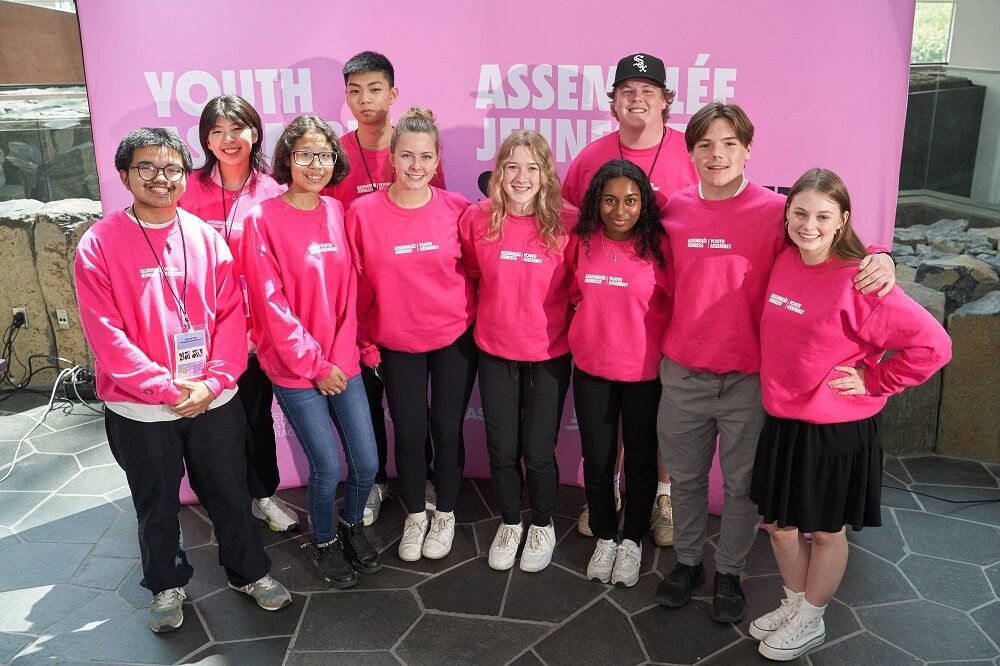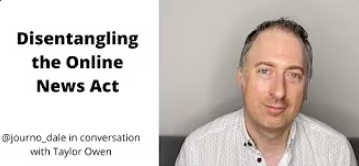Media Interviews
For media inquiries, please contact Isabelle Corriveau at isabelle.corriveau2@mcgill.ca
The Law Bytes Podcast, Episode 218: Emily Laidlaw and Taylor Owen on Saving the Online Harms Act
The Online Harms Act or Bill C-63 was introduced last February after years of false starts, public consultations, and debates. Months later, the bill appears to be stalled in the House of Commons and has yet to make it to committee for further study. Some view that as a win, given their criticism of the bill, though others who have waited years for action against online harms are beginning to fear that the Parliamentary clock is working against them.

Mother of Amanda Todd, teen who died after cyber bullying, calls on MPs to unblock online harms bill
The mother of Amanda Todd, a teen who died by suicide after falling victim to cyberbullying, is urging MPs to end a standoff in the House of Commons that is holding up a bill that would force tech companies to swiftly take down online child-abuse material.

New CBC CEO must address Canadians’ concerns directly to combat Conservatives’ calls for cuts: Bloc MP Champoux
McGill University researcher Jessica Johnson says most Canadians across the political spectrum agree on the value of an effective public broadcaster.

Une majorité de Canadiens veut préserver CBC/Radio-Canada
Un sondage national sur le rôle d’un radiodiffuseur public dans le paysage médiatique actuel suggère qu’une majorité de Canadiens souhaite préserver CBC/Radio-Canada.

Majority of Canadians want to preserve CBC and continue funding it: survey
A national survey about the role of a public broadcaster in today’s media climate suggests a majority of Canadians want to preserve CBC/Radio-Canada.



‘This law was created by and for big media:’ Google’s news deal with Canada raises hopes and concerns
Google signed a deal with a collective to distribute $100 million to Canadian news companies in early June. However, some small players believe they have not been sufficiently heard and are worried about the future

Detecting Disinformation for Democracy
Analysts, academics, journalists, activists, and politicians assess the effect of disinformation on our democracy. Experts studying mis-and disinformation share their insights on the impact and spread of disinformation, and its potential amplification through social media and the use of artificial intelligence. The special also looks at how to establish guardrails and find solutions to counter the negative effects of disinformation, with an emphasis on the role of media and citizen engagement.

A Silence Is Shattered, and So Are Many Fans of Alice Munro
Admirers said they were “blindsided” by revelations that Munro’s youngest daughter had been abused by her stepfather — and that Munro stayed with him even after she learned of it years later.

Does the Online Harms Act go too far?
Some have portrayed the Online Harms Act as a total affront to freedom of expression online.

What happened when Meta restricted news in Canada?
Facebook has officially closed its news tab in Australia, as its parent company Meta - which also owns Instagram - considers completely banning news content completely in Australia.
That's already happened in Canada, where news organisations saw huge declines in online audiences and readers were instead flooded with memes.

Youth advocates funded by CIRA Grant poised to influence Online Harms Legislation
In an age where individuals, especially youth, are chronically online, online safety policies are more important than ever. We sat down with past Net Good Grant recipient, the Centre for Media, Technology and Democracy at McGill University, to hear how they’re helping build a trusted internet in Canada.

Should Canada Ban TikTok? | The Agenda | Full Episode
The U.S. is inching closer to a potential ban on the popular app. What would it mean if Canada followed suit?

What the tick tock of online regulation says about our digital discourse
It’s been nearly impossible to scroll past the scrutiny of social media giants this past week, after the United States House of Representatives passed a bill that could lead to a ban of TikTok – with Canada now assessing its own review of the app. The social sphere shakeup comes on the backdrop of new online safety legislation and a royal photo bomb that's raising big questions about disinformation online. Piya Chattopadhyay is joined by WIRED senior writer Kate Knibbs; Taylor Owen, director of McGill University's Centre for Media, Technology and Democracy; and Philip Mai, co-director of Toronto Metropolitan University's Social Media Lab for their analysis on it all.

Facebook whistleblower Frances Haugen says it's time for accountability from tech giants
Between Canada's Online News Act, Donald Trump's recent indictment tied to the Jan.6 riots and increasing worries over harm, our relationship with social media and big tech companies is more complicated than ever. Frances Haugen, the former Facebook employee who blew the whistle on the company by disclosing thousands of internal documents joins Zandbergen to talk about the standoff between Meta and the Canadian government over Bill C-18 and what she think needs to happen to hold big tech to account.

‘She’s coming into a hot seat’: St-Onge takes on Heritage file with neither government nor big tech ‘prepared to stand down or blink’
Pascale St-Onge is taking on an already hot file, meanwhile, ‘waiting in the wings' is one of the most controversial pieces of internet regulation legislation, says Michael Geist.

Far and Widening: The Rise of Polarization in Canada
The Public Policy Forum today released a new report on polarization in Canada that makes the case that the country is not immune to the corrosive forces sweeping democracies worldwide.

Why competition law has failed Canadian media
Our competition authorities have focused too narrowly on economic factors, neglecting the importance of editorial diversity.

Disentangling the Online News Act
The Online News Act (Bill C-18) is now law, and absolutely everyone has described it poorly and created confusion about what it's actually all about. I talk with McGill University's Taylor Owen about the aims of the legislation and how we should be thinking of it. Let's talk #cdnpoli.
